Harmful effects of HP bacteria
Is HP bacteria dangerous is a question of many people. HP bacteria is a type of bacteria that lives in the stomach. To survive, HP bacteria must secrete an enzyme called Urease to neutralize the acidity in the stomach.
HP bacteria colonize the stomach and cause chronic gastritis. Most patients infected with HP never experience clinical symptoms, despite chronic gastritis. About 10-20% of those colonized with HP eventually develop gastric and duodenal ulcers and gastritis. HP infection is also associated with a 1-2% risk of gastric cancer and a less than 1% risk of gastric MALT lymphoma.
Although about 60% of the world's population is infected with stomach HP bacteria, fortunately not all patients experience the harmful effects of stomach HP bacteria. In fact, there are many cases of patients infected with HP bacteria but have no symptoms. This depends on whether the strain of stomach HP bacteria that infects the body is harmful to the stomach or not.
If it is a strain of HP bacteria that is harmful to the stomach, you may encounter some health problems such as:
- Risk of gastric ulcers, the rate of gastric ulcers caused by HP bacteria accounts for >10% of total infected cases.
- Atrophic gastritis, which occurs after prolonged gastric ulceration, causes fibrosis of tissues, causing atrophy of the gastric mucosa. Atrophic gastritis caused by HP bacteria usually accounts for about 5%.
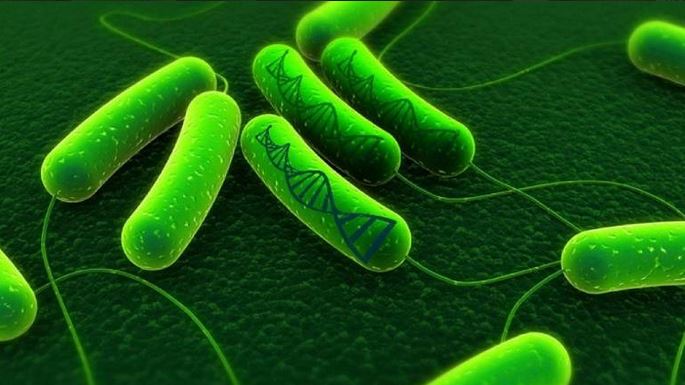
HP bacteria invade the stomach and cause chronic gastritis
- Gastric bleeding, often starting from untreated ulcers, leads to the spread of the ulcer area and causes bleeding.
- Ulcer infection, long-term ulcer inflammation can cause gastric ulcer. The rate of ulcer infection is quite low, less than 1%.
- Stomach cancer caused by HP bacteria accounts for a very low rate of only about 1%. However, this is a very dangerous disease for the patient's health.
Who is susceptible to HP bacteria infection?
The way HP is transmitted is still unclear, but the main route of infection is still from person to person through the digestive tract. Especially saliva.
Therefore, if someone in the family is infected with HP, it is necessary to pay attention to eating and contact. For example: do not share dipping sauce bowls, do not share bowls, cups, spoons, chopsticks, toothbrushes, etc. In particular, children are also susceptible to infection if adults are not careful. And because it is easily transmitted in the family, treating this bacteria is very difficult and easy to relapse.
Some groups of patients are at high risk of HP bacteria infection, including:
- People living in developing countries, medical conditions and hygiene are not really good.
- Living with someone infected with HP bacteria
- Densely populated areas.
- Residents in areas without access to clean water.
- Children are at higher risk of infection with HP bacteria and other intestinal bacteria than adults due to lack of awareness of personal hygiene and the habit of putting their hands in their mouths.
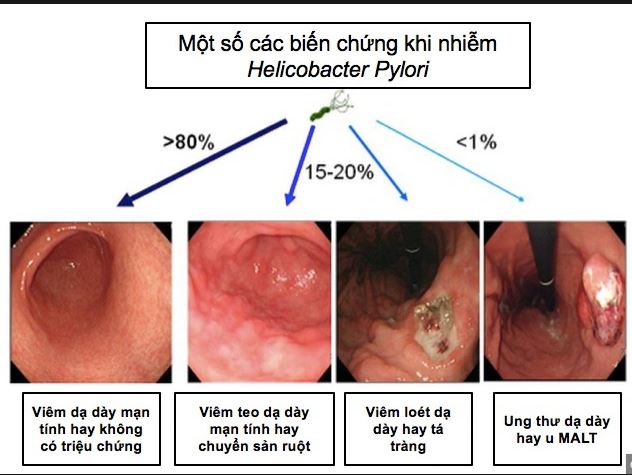
About 10-20% of people colonized with HP eventually develop gastric and duodenal ulcers and stomach pain.
When should I seek treatment if I have HP infection?
Most patients infected with HP do not have typical clinical manifestations. Only about 15% progress to gastric and duodenal ulcers and cancer. However, in gastric and duodenal ulcers, 60-95% of cases are infected with HP, and in cancer, up to 80% are infected.
The treatment of HP is also not an easy problem. HP currently has a very high rate of drug resistance. It is necessary to use a combination of many antibiotics and strong acid secretion inhibitors to treat it. And thus, many side effects will appear, causing patients to stop treatment if not consulted in advance.
Treatment time is long (1-2 weeks of attack treatment followed by 4-6 months of maintenance) and requires the patient to strictly follow the regimen, especially diet, isolation, etc.
There are many different treatment regimens depending on the condition and physical condition of the patient. However, the drugs in the attack phase may have some side effects such as: continuous bitter taste in the mouth, nausea, diarrhea, possibly headache... These symptoms will disappear after a few days but also make the patient very uncomfortable. Some patients, if not carefully advised, may stop treatment during this phase.
Another thing that people often overlook, which reduces the quality of treatment or makes it unsuccessful, is: Some drugs for treating stomach diseases should be taken before meals, some should be taken after meals, not all drugs should be taken after meals. People should ask their doctor again if the prescription does not include specific instructions or they do not know how to take the medicine. After 2 months of treatment, people should go back for a check-up to check their HP infection status.
Although HP treatment is difficult as mentioned above, if we accidentally discover that we are infected with HP, we should not be too panicked but need to seek advice from a doctor for specific instructions. Treatment also depends on each specific case, not all cases require treatment.
MSc. Dr. Tran Minh Phuong
Source


![[Photo] National Conference "100 years of Vietnamese Revolutionary Press accompanying the glorious cause of the Party and the nation"](https://vphoto.vietnam.vn/thumb/1200x675/vietnam/resource/IMAGE/2025/5/30/1cf6cd5c8a934ebfa347028dcb08358c)
![[Photo] General Secretary To Lam receives Chief of the Central Office of the Lao People's Revolutionary Party](https://vphoto.vietnam.vn/thumb/1200x675/vietnam/resource/IMAGE/2025/5/30/140435f4b39d4599a3d17975dfb444c5)






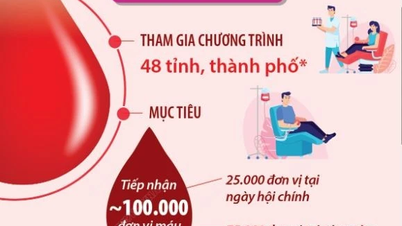
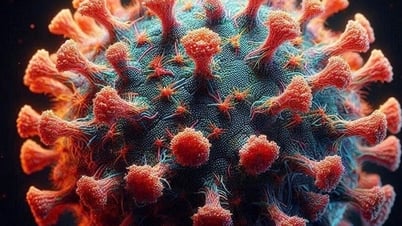

![[Video] Ho Chi Minh City: Number of COVID-19 cases increases rapidly, 2 deaths recorded](https://vphoto.vietnam.vn/thumb/402x226/vietnam/resource/IMAGE/2025/5/31/5fe289cf72774d918f23fe88bb1686ce)



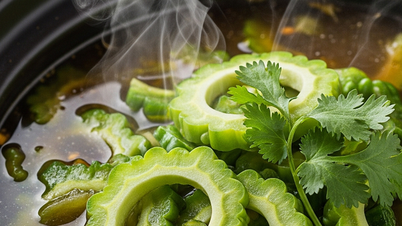




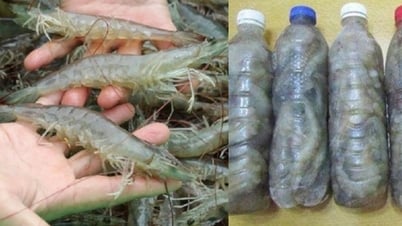





![[Photo] Journalists moved to tears at the Memorial Service for the soldiers who died in Gac Ma](https://vphoto.vietnam.vn/thumb/1200x675/vietnam/resource/IMAGE/2025/5/30/9454613a55c54c16bf8c0efa51883456)


































































Comment (0)